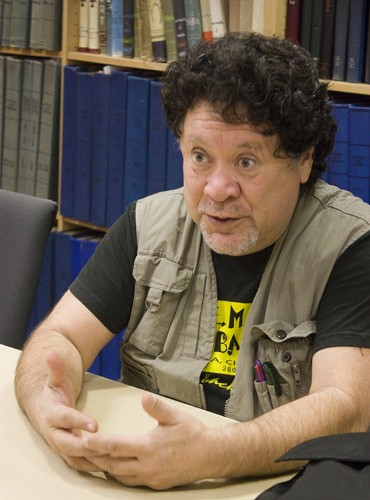Director Luis Argueta visited the UA on Monday for a screening of his newly completed documentary, “”AbUSed: the Postville Raid.”” The film explores the Immigrations and Customs Enforcement raid of a Postville, Iowa, meat-packing plant in May 2008, during which 389 undocumented workers were arrested. Argueta interviewed some of these workers, many of whom were deported, as well as social workers and community members. Argueta was born in Guatemala and immigrated to the United States. His work mainly focuses on issues concerning Guatemala.
How do you see yourself as a filmmaker?
“”I am an American filmmaker who tells stories about my country of origin and my adopted country. I live in one of the most diverse cities in the U.S., which is New York, and I truly believe that what this country stands for is worth fighting for, and I think the story of Postville is a story that everyone should know.””
How were you able to get immigrants to share their stories?
“”If you know Guatemalans, we’re very closed. They began talking at the beginning, but I realized this was not the whole story. It took more than one trip for people to realize that I was serious. It also helped that I spoke Spanish, Guatemalan Spanish. No, it wasn’t easy, but finally they did. Also, when I would go back and bring back pictures of their family or take pictures of their grandchildren who lived here to grandparents that lived (in Guatemala), a link was established that made it easier. At that point, it wasn’t so much about telling a story as it was to accompany them in this journey.””
What effect did the raid have on Postville?
“”It was totally traumatic. Psychologists and academics have studied what happened, and everyone agreed that post-traumatic stress syndrome was present, not only in the immigrant workers and the immigrant children but on the U.S. people, on the U.S. children because they played with the immigrant children at school … The town was devastated because this plant, which was a major employer, lost over half its workforce … It was a chain reaction on the economic side.””
What was Postville like nearly two years after the raid? (Argueta returned last March.)
“”There are some changes. The plant was sold to a Canadian owner. It is still not working at 100 percent capacity. They began killing cattle in the spring, but while they used to kill 500 cattle a day, they’re down to about half. That also shows that the migrants were doing work that no one else wants to do.””
How does Postville relate to the larger picture of immigration in the United States?
“”By being the case that it is, the largest immigration raid at a single worksite at the time, it showed really some of the major problems with immigration. There was an industry, there was a town, that was benefiting from the work that these people did. And there is a factory, and there is a town, that has not recuperated from the trauma, the economic trauma and the psychological trauma. Even though we do not have worksite raids now the way we did in Postville, we have what’s called soft raids or paper raids, and the effect is the same. Large numbers of people get fired, families get separated, and the economic and psychological effects are still the same … (Postville) was a real low in our legal history … Postville, in that sense, is a real example of how we have begun to criminalize immigrants. And we are cutting our nose to spite our face.””
What would you like to see in U.S. immigration policy?
“”I think that one of the most important things about immigration reform is for national security. We can’t have 11 million or 12 million people here and not know who they are. On the other hand, the benefits are very clear. They are wage earners; they’re making money for companies. I think we have to be pragmatic. You cannot deport 12 million people. It is impractical, impossible … There should be paths to citizenship at different points. Backgrounds should be checked. The Obama administration said they’re focusing on the criminal element, but that’s not the truth … It’s not working the way it’s designed. We’re still deporting 1,077 people a day, and a lot of those are without criminal records. We are affecting our community. So I think we need a rational immigration reform that looks at things the way they are … I think that one element I would like to see in the discussion of immigration is to look at immigrants not as ‘the other’ but as ourselves. While there are enemies of this country that want to harm us, not everyone who’s coming over the border out of desperation is an enemy.””









